I'm Achisa Panichakul, a first-generation third year student at the University of Denver. I'm majoring in Biological Sciences and Psychology, with minors in Chemistry and Human Health Sciences and Systems on the Pre-Med track. I studied at Mahidol University International College in Thailand, through CIS Abroad in 2024. I'm very grateful to my program directors, the friends I made in my cohort, MUIC, and everyone that has made my journey in Thailand this wonderful, memorable, experience!
Looking back into my fall semester in Thailand with CIS Abroad, it all felt like a fever dream. As there are many things to reflect upon- this experience felt like the longest, yet, it ended so quick at the same time. The moment I entered the plane to fly back home to the United States, and took one last look at my friends made at the dormitory I stayed in, it was as if we knew each other for years- even though we knew each other for months. That's how close my friendships were with these lovely people I had met during this journey.
As many say, time is our biggest enemy. During my flight back home, all I could think back are orientation, our group excursions, our group nights out, my mini-trips with the friends I've made in the program, and the lessons and reflections I've gained from this program. Here are a couple of highlights and reflections of my time abroad, and a couple of lessons and takeaways that I've learned myself as a Thai-American.
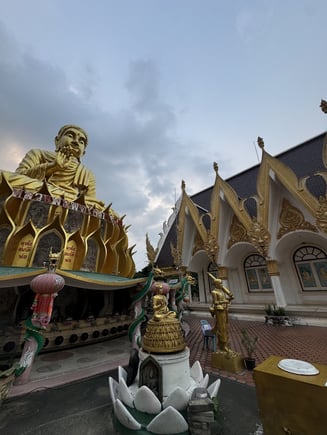
One of the main reasons I was drawn to studying abroad in Thailand was to study at Mahidol University International College (MUIC), which is highly praised by many Thai people, including my own family. Mahidol University was founded by King Chulalongkorn, one of the most honorable and respected kings in Thai history. Ranked as the #1 university in Thailand, the institution is renowned for its high-quality education. As soon as I heard about its academic excellence and variety of courses in psychology, I knew I would love it.
When I first stepped foot on campus, I felt overstimulated but also amazed. I fell in love with the campus itself. Despite Thailand's humidity and hot weather, MUIC had planted many gorgeous trees and maintained an environmentally friendly and clean campus. The landscape was filled with various trees, flowers, and small ponds. The parks on campus brought a sense of calmness to my eyes and mind. Even better, the newest building, the Aditayathorn Building, is constructed of glass, with six floors and three basement levels. It’s the largest building I’ve been in on campus, and it even has mini trees and beautiful landscaping views inside.
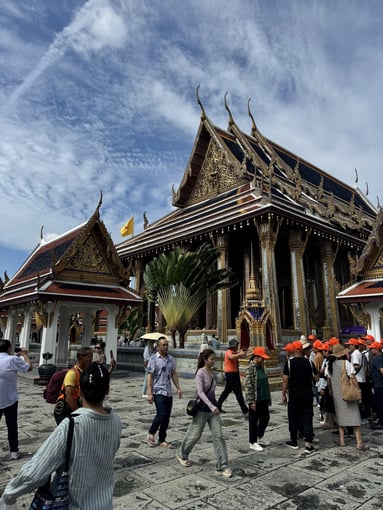 As for my classes, all of my professors were friendly, kind, and engaging. The courses I took were Psychology of Emotion, Psychology of Motivation, Abnormal Psychology, and Evolutionary Psychology—courses that are not offered at my home university. My favorite class was Psychology of Emotion because it taught me how to regulate and identify my emotions. I learned there are many ways to describe emotions beyond just using terms like "sad" or "happy." My professor was also very engaging and humorous.
As for my classes, all of my professors were friendly, kind, and engaging. The courses I took were Psychology of Emotion, Psychology of Motivation, Abnormal Psychology, and Evolutionary Psychology—courses that are not offered at my home university. My favorite class was Psychology of Emotion because it taught me how to regulate and identify my emotions. I learned there are many ways to describe emotions beyond just using terms like "sad" or "happy." My professor was also very engaging and humorous.
The culture at MUIC was another highlight. The student organizations excelled at engaging both international and Thai students to help establish long-lasting friendships. Several events were hosted on campus, such as food markets, Halloween-themed decorations, Diwali celebrations, and club fair days, featuring a lineup of performances throughout the day.
Interestingly, like many other schools in Thailand, some of our classes required uniforms. Personally, I found wearing a uniform convenient because everyone wore the same outfit, eliminating the daily stress of choosing what to wear. We had both a regular and formal uniform. The regular uniform consisted of a black skirt, a white button-up top, a pin representing Mahidol, and a belt with a buckle. The formal uniform was the same, except we wore long skirts and were required to wear our ID and lanyard.
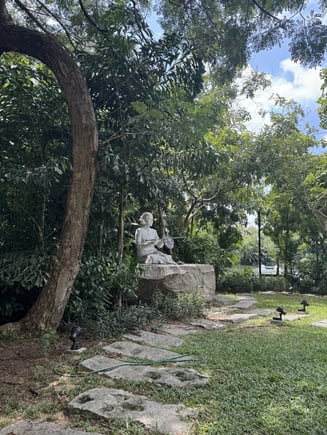
These aspects of MUIC—the faculty, the campus, and the students—made me excited to wake up early and spend the day studying, working, and interacting with other international and exchange students. However, the shuttles were probably the most challenging part of getting to school. While they operated on consistent schedules, there were times when they would drive past your stop because they were full.
A funny story: all of us stayed at Bundit Home for our dormitories, which housed students from Mahidol University—not just the International College. The shuttles had specific stops at different buildings, but there was usually only one stop for the International School. Most students would tell the driver when to stop. One morning, I took a shuttle filled with only Thai students, none of whom I recognized as MUIC students. I assumed the driver would automatically stop at the International School, but instead, he drove past it! I had to ask him to stop at a bus stop that was a 20-minute walk from the international building—lesson learned, haha!
Thailand Excursions & Trips
Thai-American born and raised in the United States but growing up in a Thai household, my experience studying in Thailand felt entirely different from the times I’d visited extended family for a month or so over the years. Those visits were usually filled with family outings to popular tourist spots—Phuket, Chiang Mai, and the iconic temples of Bangkok. While those trips were fun and meaningful in their own way, studying in Thailand through CIS Abroad gave me an entirely new perspective. This time, I wasn’t just a visitor—I was immersed in the culture, engaging with it in a deeper, more personal way.
Through CIS Abroad, I explored parts of Thailand I might never have seen on my own. I learned about the intricate details of Bangkok’s temples, experienced the wonder of interacting with elephants in Kanchanaburi, and connected with other Thai students in a way that allowed me to truly appreciate the richness of my heritage. On our first group excursion, we visited three stunning temples, but Wat Arun stood out to me the most. Its beauty was unmatched, with its intricate design and the unique artistry of its spires. I learned that its name is derived from Aruna, the Hindu god of dawn, which gave it an even deeper significance. Seeing it lit up at night in golden hues is now at the top of my bucket list for my next visit.
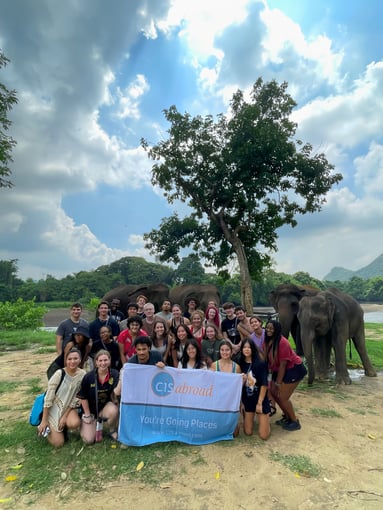 Our second group trip was to Kanchanaburi, which turned out to be an unforgettable experience despite the weather forcing us to change plans from Chiang Mai. It was here that I got to bathe, pet, and play with elephants—a moment that felt straight out of a dream. We also cooked traditional Thai dishes alongside our peers, sharing laughs and stories in the process. Beyond the planned excursions, I found joy in everyday adventures. From wandering through Chinatown, or Yaowarat as it’s called in Thai, to relaxing on the beaches of Ko Chang, every experience felt vibrant and alive. Exploring massive malls like ICONSIAM and CentralWorld was a new kind of excitement, blending modern luxury with Thai culture.
Our second group trip was to Kanchanaburi, which turned out to be an unforgettable experience despite the weather forcing us to change plans from Chiang Mai. It was here that I got to bathe, pet, and play with elephants—a moment that felt straight out of a dream. We also cooked traditional Thai dishes alongside our peers, sharing laughs and stories in the process. Beyond the planned excursions, I found joy in everyday adventures. From wandering through Chinatown, or Yaowarat as it’s called in Thai, to relaxing on the beaches of Ko Chang, every experience felt vibrant and alive. Exploring massive malls like ICONSIAM and CentralWorld was a new kind of excitement, blending modern luxury with Thai culture.
One of the most whimsical outings was visiting a corgi café—something I never thought I’d do, but it turned out to be an absolute highlight! This trip allowed me to see Thailand in a way I never had before. It wasn’t just about sightseeing—it was about connecting with the culture, the people, and the traditions that shaped my own family and identity. For the first time, I felt like I was more than just a visitor; I was part of something much bigger, and it gave me an even greater appreciation for my Thai heritage.
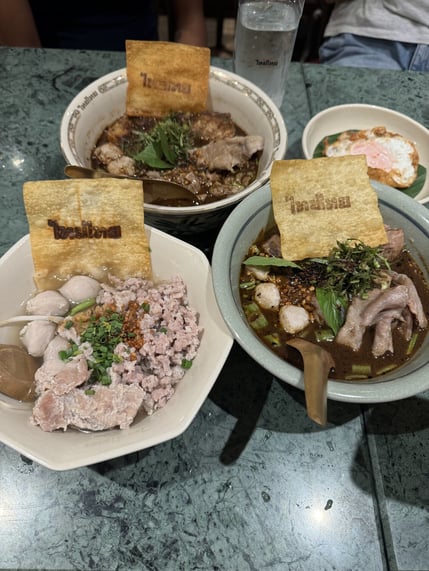
Family
Without CIS Abroadand the relationships I made within my cohort, I genuinely don't think I would have had such a fulfilling and fun time abroad. Coming to Thailand, I was incredibly nervous—I didn’t know a single person in the program, not even those who attended the same home university as me. But from the very beginning, everyone was so welcoming, warm, and enthusiastic.
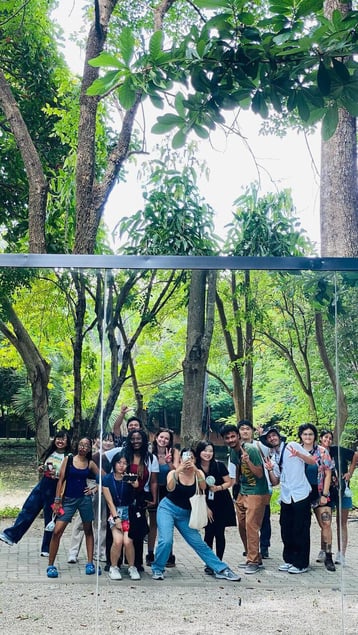
From introducing ourselves in the shuttles as we made our way from Bangkok to our dormitories, to cheering each other on while navigating the winding streets of Cambodia, to late-night chats and spontaneous adventures across Thailand and Southeast Asia, the sense of connection and community never went down.
If I had to describe my time in Thailand with one word, it would be family. With a cohort of about thirty students, I felt like we all looked out for each other, even if we weren’t particularly close. Whether it was someone offering to help carry groceries up the dorm stairs, staying up to talk after a tough day, or simply checking in during class, these small moments created a sense of belonging that was so heartwarming and comforting.
I found something special in each and every person. Through countless conversations, I realized just how unique, caring, and inspiring everyone was. On campus, it was almost impossible to feel lonely—someone from CIS Abroad was always there to wave me over to join them for lunch or to make plans for the weekend. Around the dormitories, we’d invite each other out for dinner or gather for impromptu group hangouts. There was this unspoken understanding that we were all in this experience together, and because of that, we leaned on one another.
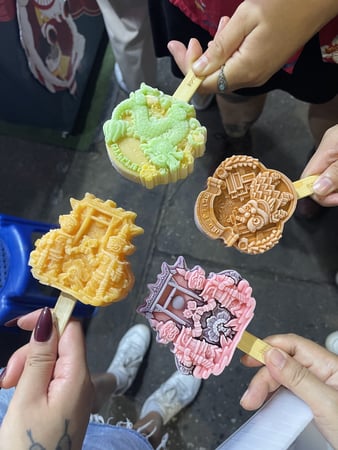 What stood out the most was the way everyone genuinely cared. It wasn’t just surface-level friendliness; it was the kind of warmth that made me feel like I belonged, even in a place so far from home. Whether we were exploring temples, getting lost in bustling markets, or just sitting around swapping stories, these moments with my cohort made every challenge and every new experience abroad even more meaningful. It wasn’t just about the places we visited—it was about the people I got to share it with, and that’s something I’ll always carry with me. To this day, a lot of us still keep in contact with one another and hope to navigate another country on the map together in the near future.
What stood out the most was the way everyone genuinely cared. It wasn’t just surface-level friendliness; it was the kind of warmth that made me feel like I belonged, even in a place so far from home. Whether we were exploring temples, getting lost in bustling markets, or just sitting around swapping stories, these moments with my cohort made every challenge and every new experience abroad even more meaningful. It wasn’t just about the places we visited—it was about the people I got to share it with, and that’s something I’ll always carry with me. To this day, a lot of us still keep in contact with one another and hope to navigate another country on the map together in the near future.
As these were my reflections on my abroad experience, I had learned a lot of things about myself, with a lot of self-growth and independence. I encourage many study abroad students to do the same. I remember being a very shy person during my trips in the past in Thailand- nowadays, I feel more confident and independent in navigating across the country and even in other countries myself. So, here are my key takeaways:
1. Don't Be Afraid to Try New Things
Whether this may be your first time studying abroad, it may actually surprisingly change your mind. Either way, take every opportunity that comes your way. Whether it's trying unfamiliar food, learning a new language, or taking part in a cultural tradition, these experiences will build more enrichment in your journey and leave you with unforgettable memories.
2. Put Yourself Out There
It can be nerve wrecking and intimidating at first, entering a new, unfamiliar country on your own. But, it is the perfect chance to step outside your comfort zone. Say yes to the group outing, start up conversations with people in your program (or your classmates in school!), and immerse yourself in the local culture. Even as a Thai-American myself, I feel like I've grown so much, and you would be surprised to see how much growth you've gotten just by taking those small steps.
3. Make Connections
Studying abroad isn't just about learning the culture of the place you're in- it's also about the people you meet along the way. Some of the most meaningful moments come from the connections you form with your peers, the locals, and even yourself. These relationships will help shape your experience and might just last a lifetime, just as I found my new family.
4. Use Your Voice
Never be afraid to speak up. If your food is too spicy, or you have an allergy, don't be afraid to speak up - politely, of course. Whether it's asking for help, sharing your ideas, or contributing to group discussions, go for it. Your voice matters, and the more you practice putting yourself out there, the more confident you'll feel in any situation.
Again, thank you to CIS Abroad & everybody who made my abroad journey in Thailand memorable!
Discover more about studying abroad in Thailand here!
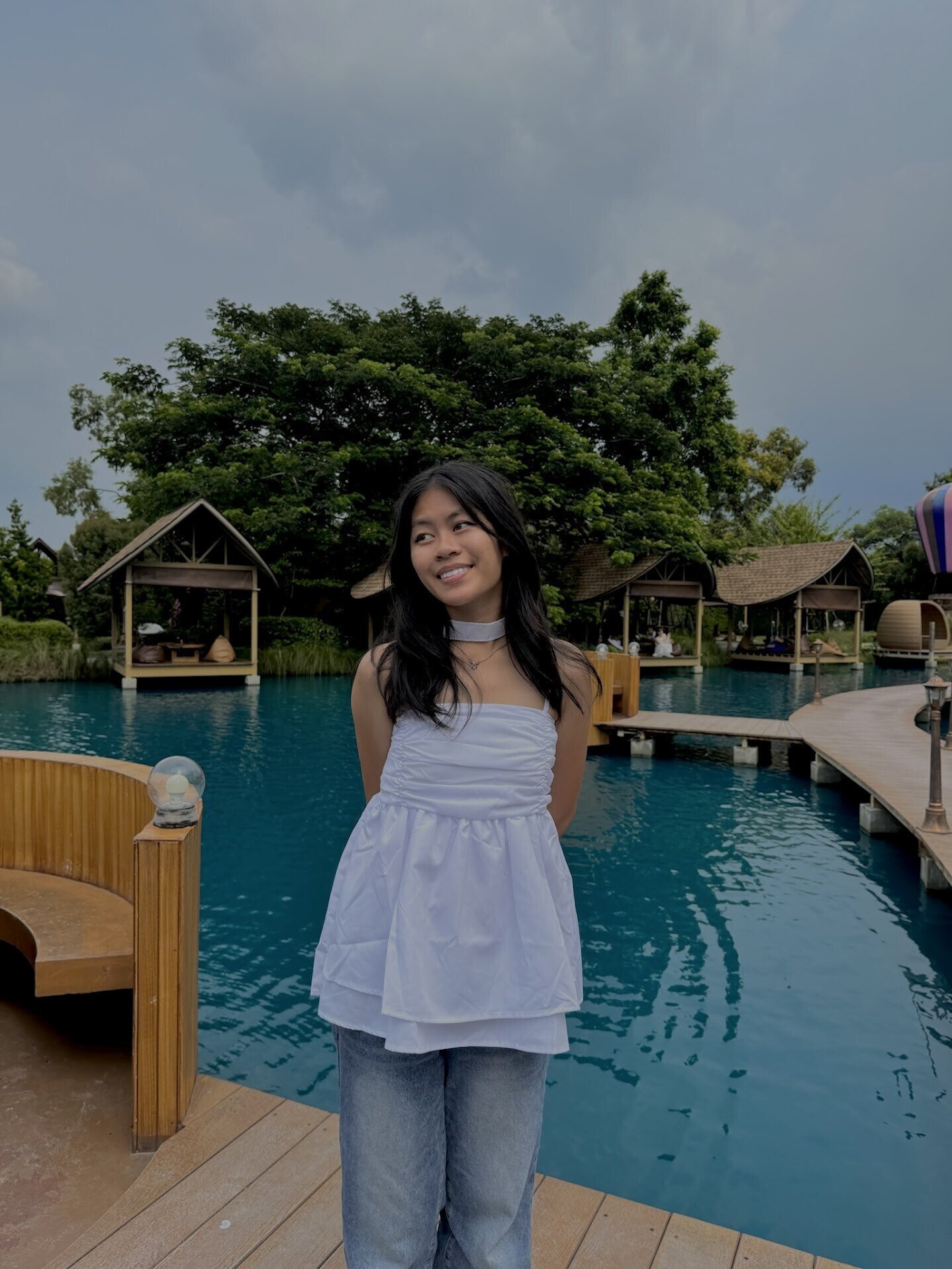
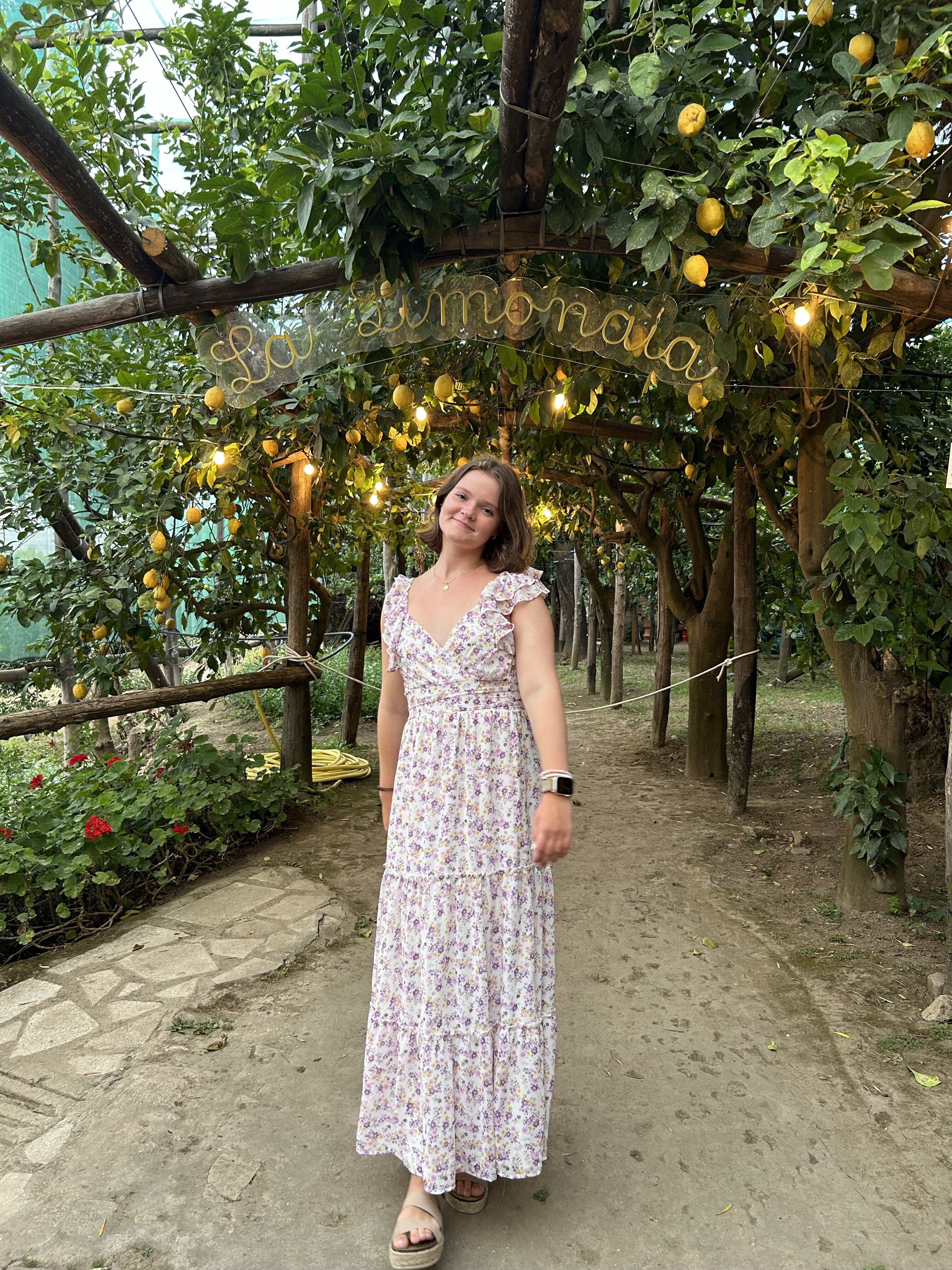

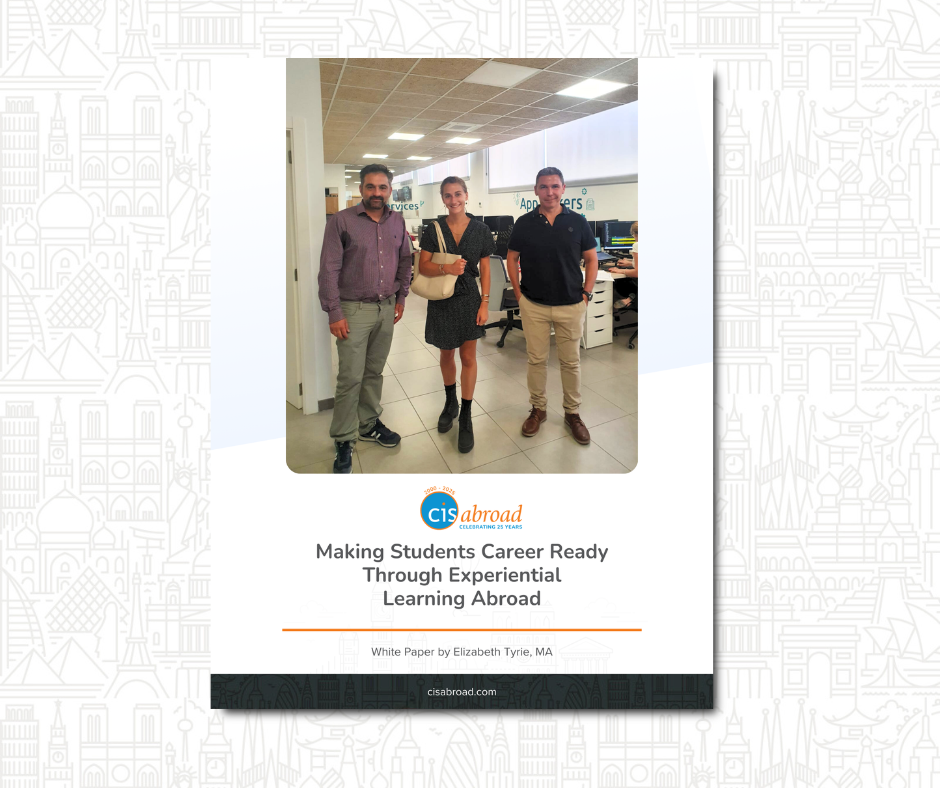


 As for my classes, all of my professors were friendly, kind, and engaging. The courses I took were Psychology of Emotion, Psychology of Motivation, Abnormal Psychology, and Evolutionary Psychology—courses that are not offered at my home university. My favorite class was Psychology of Emotion because it taught me how to regulate and identify my emotions. I learned there are many ways to describe emotions beyond just using terms like "sad" or "happy." My professor was also very engaging and humorous.
As for my classes, all of my professors were friendly, kind, and engaging. The courses I took were Psychology of Emotion, Psychology of Motivation, Abnormal Psychology, and Evolutionary Psychology—courses that are not offered at my home university. My favorite class was Psychology of Emotion because it taught me how to regulate and identify my emotions. I learned there are many ways to describe emotions beyond just using terms like "sad" or "happy." My professor was also very engaging and humorous.
 Our second group trip was to Kanchanaburi, which turned out to be an unforgettable experience despite the weather forcing us to change plans from Chiang Mai. It was here that I got to bathe, pet, and play with elephants—a moment that felt straight out of a dream. We also cooked traditional Thai dishes alongside our peers, sharing laughs and stories in the process. Beyond the planned excursions, I found joy in everyday adventures. From wandering through Chinatown, or Yaowarat as it’s called in Thai, to relaxing on the beaches of Ko Chang, every experience felt vibrant and alive. Exploring massive malls like ICONSIAM and CentralWorld was a new kind of excitement, blending modern luxury with Thai culture.
Our second group trip was to Kanchanaburi, which turned out to be an unforgettable experience despite the weather forcing us to change plans from Chiang Mai. It was here that I got to bathe, pet, and play with elephants—a moment that felt straight out of a dream. We also cooked traditional Thai dishes alongside our peers, sharing laughs and stories in the process. Beyond the planned excursions, I found joy in everyday adventures. From wandering through Chinatown, or Yaowarat as it’s called in Thai, to relaxing on the beaches of Ko Chang, every experience felt vibrant and alive. Exploring massive malls like ICONSIAM and CentralWorld was a new kind of excitement, blending modern luxury with Thai culture.

 What stood out the most was the way everyone genuinely cared. It wasn’t just surface-level friendliness; it was the kind of warmth that made me feel like I belonged, even in a place so far from home. Whether we were exploring temples, getting lost in bustling markets, or just sitting around swapping stories, these moments with my cohort made every challenge and every new experience abroad even more meaningful. It wasn’t just about the places we visited—it was about the people I got to share it with, and that’s something I’ll always carry with me. To this day, a lot of us still keep in contact with one another and hope to navigate another country on the map together in the near future.
What stood out the most was the way everyone genuinely cared. It wasn’t just surface-level friendliness; it was the kind of warmth that made me feel like I belonged, even in a place so far from home. Whether we were exploring temples, getting lost in bustling markets, or just sitting around swapping stories, these moments with my cohort made every challenge and every new experience abroad even more meaningful. It wasn’t just about the places we visited—it was about the people I got to share it with, and that’s something I’ll always carry with me. To this day, a lot of us still keep in contact with one another and hope to navigate another country on the map together in the near future.